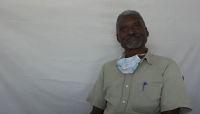“I don’t have anything else to lose. The only thing I have left is to keep fighting in Cuba until my death.”
Pablo Moyá Delá was born on November 7, 1955 in Mayarí Arriba, Cuba. He grew up in Palma Soriano on the coffee farm called “La Región” that his grandfather had left him. He helped his father on this farm until he was 15 years old. In 1959, after the triumph of the Cuban Revolution, the Agrarian Reform of Cuba was proclaimed, and the farm was confiscated. At this time, Pablo joined the organization of the “Columna Juvenil del Mar,” a gathering of future fishermen founded in 1970. From this organization, he was called on to study at the Naval Academy. Between 1971 and 1975, he took cooking courses and spent the next 25 years cooking on a Cuban navy ship. In 1997, he was fired from the navy but found work in the private sector as a self-employed cook in Palma Soriano in 1998. Being self-employed brought him many legal problems. Therefore, he gathered other workers with similar problems and prepared a document with the requirements and rights requested for self-employed workers in Cuba. In 2012 he was forced to hand over his self-employment permit in Palma Soriano. Today he lives in Havana and continues fighting for the rights of the self-employed workers in Cuba.
